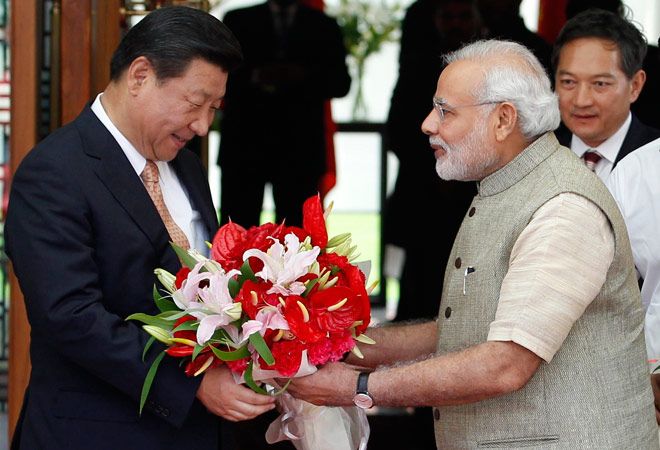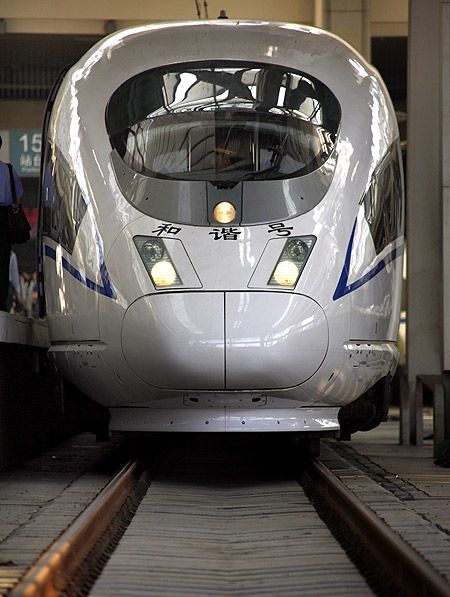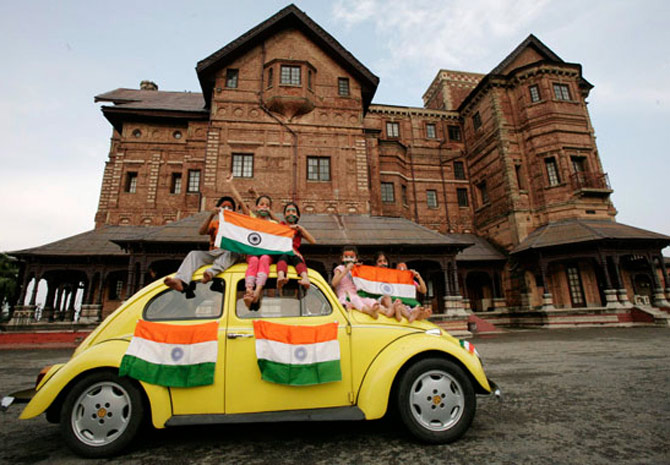 | « Back to article | Print this article |
Read through the list of 16 memorandums of understanding (MoUs) signed between China and India during President Xi Jinping's state visit a fortnight ago and it is hard to pin down the $20 billion in FDI promised, notes Rahul Jacob.

The first MoU, signed by the respective foreign ministers, Sushma Swaraj and Wang Yi, facilitates the long march of pilgrims on the arduous Kailash Mansarovar Yatra, who will be able to travel through Tibet.
Further down the list is an MoU that indicates that "both sides have agreed that China will participate in the New Delhi World Book Fair 2016 as the Guest of Honour Country".
But let's take on faith that Chinese will invest about … well, okay somewhere between the roughly $400 million they have invested in the last decade and a half as India's 28th largest foreign investor and the $20 billion over the next five years the government assure us they will.

The serious money, one imagines, will be spent on upgrading Indian Railways with Chinese help and, of course, on those two large special economic zones (SEZs) in Gujarat and Maharashtra.
The Maharashtra industrial development corporation's 1,250-acre SEZ is to be built in partnership with Beiqi Foton Motor Co Ltd on the left-hand column of the Ministry of External Affairs (MEA) website listing or Beiqi Futon Motor Co Ltd on the right-hand side.
Maharashtra could be getting a world-beating commercial truck and Toyota knock-off sedan company that also makes Japanese-style cotton mattresses on the side, while Gujarat just got the Nano.
(Do we need another SEZ for a car company?) This is the age of official handout journalism in India.

In that sense, the Indian and Chinese governments are now well matched, but it means it is hard to get detailed answers.
It is still worth contemplating how the Chinese will invest that money and what changes this will bring about in the country.
Finishing large infrastructure projects, Chinese style, within three years instead of 10 in India is a good thing.
Will they bring their own workers to build SEZs and infrastructure projects as they have done in from Sri Lanka to Africa?
Would we let them?
Has the MEA discussed this? For a preview of the manner in which Chinese investment transforms places in good and bad ways, there are few more accessible sources than Howard French's recent book, China's Second Continent: How a Million Migrants Are Building a New Empire in Africa.

Mr French quotes China Exim Bank figures that suggest that China extended $63 billion in loans to African countries in the first decade of the 21st century.
Completed projects are estimated to be about $50 billion, a significant amount of money. The investment was driven as much by private Chinese entrepreneurs as by state diktat.
In Mozambique, he meets a businessman named Hao Shengli who uses swearwords while talking with locals in the way other people might use verbs.
"The market capacity of the blacks is pretty bad. The thing you need to know about them is that they only do what they are supposed to do when you are watching them," Mr Hao tells Mr French in one of his more polite comments. In Senegal, the author meets a businessman called Li Jicai who says it is a lot easier to make money in hyper-competitive China.
"There is no future in Africa. How will they develop with the kind of education they have here?
Look at China. We are putting people into space. We are developing technologies," Mr Li says.
"But, these people, they are impossible to teach, whether it is how to build a building or how to make a road. They just don't learn."

In Liberia, Mr French meets a hotelier who explains that Chinese people typically bring their own towels because they would rather not use towels used by hei ren, or black people.
A few years ago, I visited the port the Chinese were building in Hambantota in southern Sri Lanka and was surprised to find an entire colony of Chinese workers in the Sri Lankan president's former constituency.
The highway being built from Colombo to Hambantota is a marvel by South Asian standards.
In Colombo three years ago, I fell into conversation with the interpreter for a Chinese company that was building the arts performance centre.
It turned out that the workers were not allowed out of the premises to keep contacts with the locals to a minimum unless they needed hospitalisation.
Their salaries were sent home directly. The prejudices the Chinese carry with them mean they are not natural global managers.
Yet Mr French's book suggests they are succeeding as entrepreneurs in Africa, even if the benefits for the Chinese government are much less clear.
One comes away with the sense that there will be a colossal culture clash when China invests large sums in India because the Chinese appear to be almost as racist as we are.
Earlier this week, while Prime Minister Narendra Modi was meeting an American president who happens to have a Kenyan father, a mob on the Delhi Metro brutally attacked three students from Burkina Faso and Gabon for no reason - other than that they were black Africans.
A police booth they had taken refuge in was smashed up.
The three young men were attacked with steel rods and glass shards, while the mob alternately hurled things at them or laughed as they took multiple pictures on mobile phones (the video is at http://goo.gl/h7hCKa).
If we treated them better, the legions of Africans studying in India - at NIIT or Amity in the case of these youngsters - could become ambassadors for India when they return home or even promote trade ties. Despite our historic advantage of a diaspora there, China has stolen a march on us in Africa.
If they do invest anything close to $20 billion in India, let's at least please be polite to them.